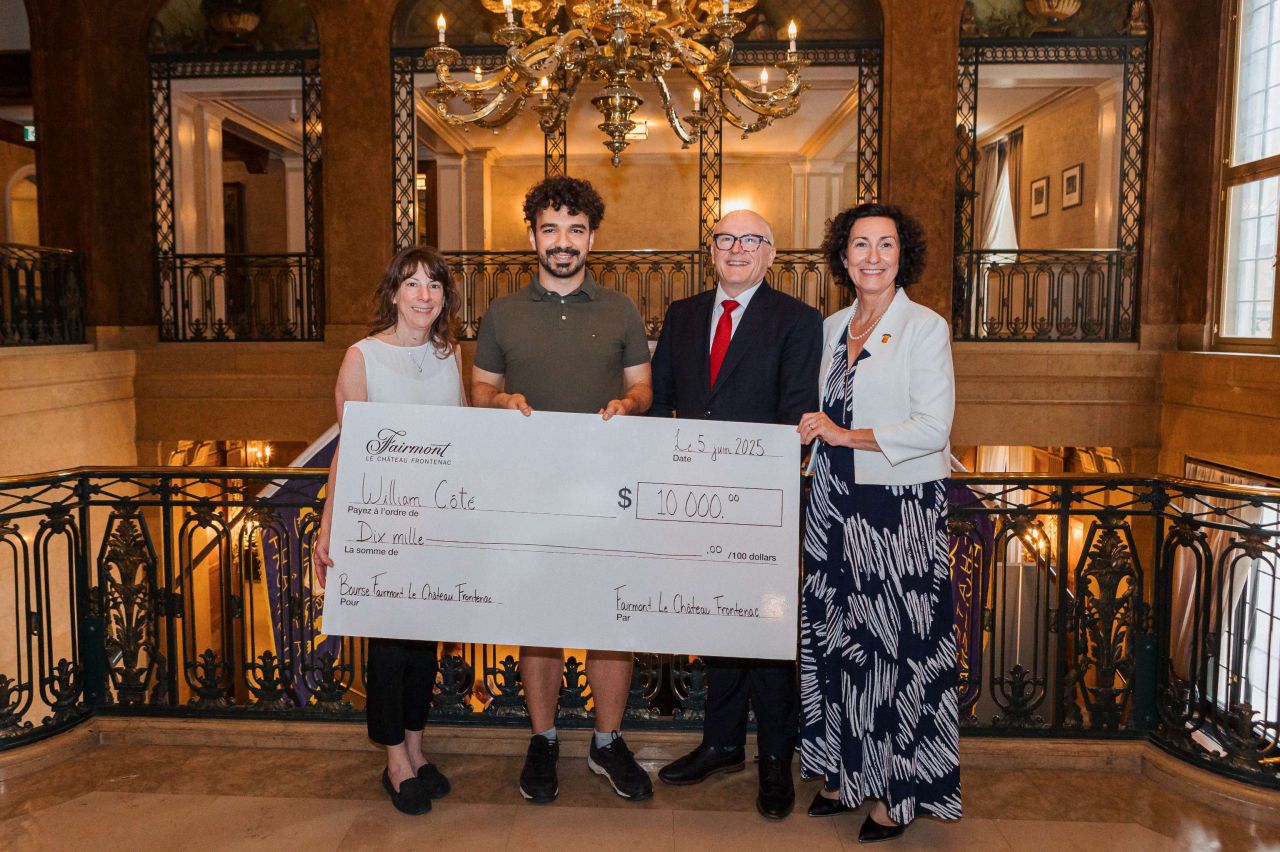William Côté honored by Fairmont Le Château Frontenac for his research in bioenergy!
It is with great pride that we announce that William Côté, a forestry graduate student under the supervision of Professor Evelyne Thiffault, has been awarded a $10,000 excellence scholarship by Fairmont Le Château Frontenac during the prestigious Rector’s Circle Dinner, held on Thursday, June 5 at the same venue.
This distinction highlights the excellence of William’s research in bioenergy—a strategic field for the energy transition and the fight against climate change. By harnessing the potential of forest resources to produce renewable and sustainable energy, he is actively contributing to building a greener future for Quebec.
His commitment, scientific rigor, and innovative vision make him a leading figure in forestry research. This scholarship not only provides significant financial support, but also stands as institutional recognition of the vital role that young researchers play in shaping a more resilient world.
Congratulations to William Côté on this outstanding achievement!

Research Project Title: Greenhouse Gas Emission Reduction Potential of a Forest Bioenergy Supply Chain
Summary
Reducing dependence on fossil fuels is essential to mitigate the effects of climate change. Forest bioenergy, a renewable energy source, can support this transition by replacing fossil fuels and reducing greenhouse gas (GHG) emissions. However, the energy efficiency of bioenergy products is generally lower than that of fossil fuels, and their carbon balance varies depending on several factors: the biomass source, the conversion pathway used, and the energy efficiency of the system.
In Quebec, only so-called « residual» forest biomasses are used: logging residues (primary), sawmill residues (secondary), post-consumer wood (tertiary), and unclaimed wood. Each type presents a different potential for GHG reduction. Moreover, conversion pathways—which include steps such as comminution, drying, and the use of external energy—generate variable emissions depending on the technologies employed.
My project aims to assess the extent to which the use of forest bioenergy can reduce GHG emissions by replacing fossil energy sources. To achieve this, I will use a dynamic life cycle assessment (LCA) that integrates material, carbon, and energy flows, from supply to end use, accounting for both fossil and biogenic emissions. The goal is to identify the most efficient and impactful conversion pathways for the energy transition.
Potential Impacts of the Project
This project aligns perfectly with the objectives of the Fairmont Le Château Frontenac – Forest Carbon Scholarship, directly supporting the fight against climate change and the valorization of forest carbon. Initially launched during my master’s program, this project will continue at the doctoral level thanks to the scholarship, which enables me to pursue my scientific commitment.
One major outcome of the project is the comprehensive modeling of carbon flows, from the forest to the end-of-life of wood products. This LCA-based modeling takes into account different end-of-life options (recycling, incineration, landfill with or without GHG recovery), which are often driven by economic rather than ecological factors. By analyzing these scenarios, it will be possible to establish a hierarchy of conversion pathways based on their actual potential to reduce GHG emissions.
This work will help guide decision-making in Quebec’s forestry sector by identifying the most sustainable valorization options. It also strengthens the development of strategic expertise in forest carbon, which is essential to equip our society to face climate challenges. Through this project, I will develop in-depth expertise in LCA, forest policy, and radiative forcing dynamics, with the goal of proposing pragmatic solutions for a low-carbon future.

